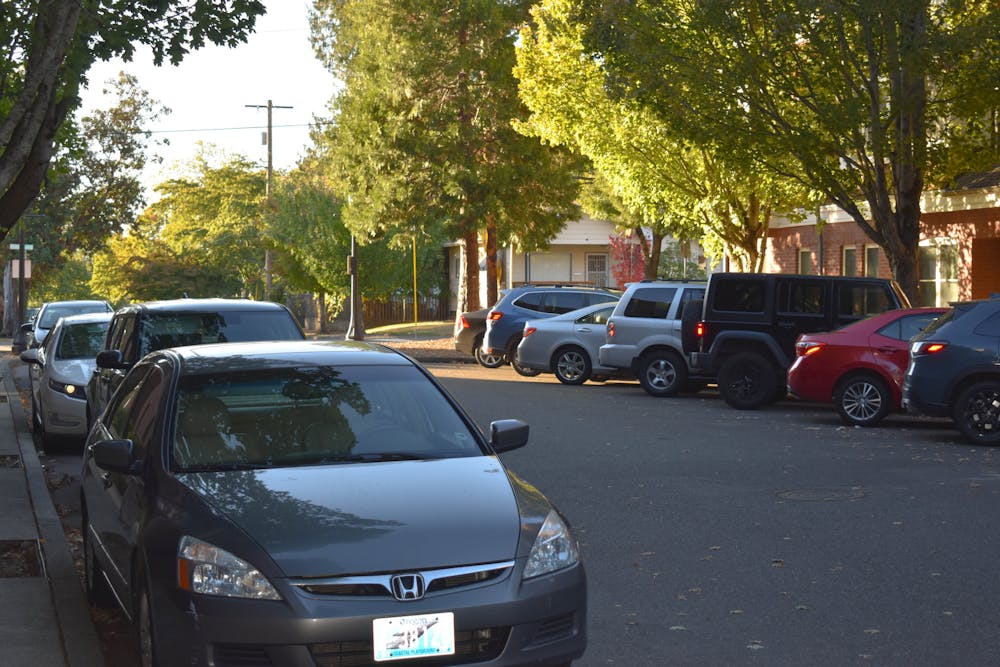First-year commuter student enrollment has risen at UP this fall, signaling a shift in how incoming students are navigating college expenses and the appeal of staying closer to home.
Based on an all-student report from the Shepard Academic Resource Center, there are currently 147 first-year students not living on campus, compared to 75 students from fall 2024.
Michael McNerney, director of campus safety and emergency management, says that UP’s enrollment demographics have changed in recent years. Approximately 40% of the student body used to come from California, but now it’s Oregon.
“If you want to eat three squares and have a good place to sleep, living on campus is pretty solid, but if your parents are across town, you're gonna go live with [them], save money and have all those support structures in place,” McNerney said. “I think we're seeing the uptick of [commuting] as a really prominent option for students as the demographics shift.”
Director of Residence Life, Housing & Community Standards Andrew Weingarten, who reviews all commuter applications, says that he’s noticed a variety of factors contributing to the increase in commuting first-years. Obligations like providing familial care or support, jobs outside of UP and the cost of living are a few of these factors.
“I talk to a lot of students who live nearby, and they really want to be a part of the UP community, and they want to study at UP and to contribute to the campus life here, but they want to live at home or they need to because of these other obligations,” Weingarten said. “So I'm glad that we have that opportunity for them to do that.”
McNerney says that the increase in first-year commuters could also be a symptom of coronavirus culture, with more students choosing local colleges.
“I do think there's been sort of a culture shift,” McNerney said. “We still have some vestiges of what I would call the ‘COVID mentality,’ where we've become acclimated to living in a more confined, familial unit, and so there's less impetus to sort of break out of that.”
To qualify as a commuter, students must prove they meet the university’s criteria. The incoming student must reside at a permanent residence with their parents or guardians, and the address must be within a 20-mile radius of the UP campus.
Exemptions are also approved for incoming students who are married or 21 years of age or older at the start of their first semester, according to UP’s website. Once approved, commuting exempts the incoming student from the two-year residency requirement, which applies to first-years and sophomores.
For Maggie Mailee Redden, a senior history major who has commuted all four years at UP, expenses played a big role in her decision to stay home.
“I'm from here, and it was cheaper than living on campus,” Redden said. “I don't even have money for tuition, so, we're doing that.”
The influx of commuting students brings more cars to campus, but McNerney says that UP has not been at full parking capacity since the student body size has decreased in recent years.
While UP prides itself on being a residential campus, according to Weingarten, the reality is that many first-year students aren’t living on campus. Despite the vacant beds, Residence Life wants to emphasize the available resources for commuters of all years.
Cherokee Trent is the commuter student support coordinator this year. Her role is to ensure that commuter students have a space on campus, like the commuter student lounge. Located in Franz Hall Room 123, the lounge provides lockers and utilities like microwaves and a refrigerator exclusively for commuter students.
“[It’s] really nice … It’s a space for students to call their own,” Trent said.
To access the lounge, commuter students can visit Campus Safety to activate their UP ID.
Trent’s role also includes finding ways to connect commuter students on campus. She says that she is in the process of organizing one event per month for commuters to meet and mingle.
One idea is walk-over events, where commuter students can join the dorm halls and attend events together.
“There's so much going on around here at night and on the weekends and so many good reasons to live on campus,” Weingarten said. “I know that it's not for everybody, because of other obligations and finances and whatnot, but I also want commuter students to know that they can always come in anytime, too, if they want to.”
More information about events can be found on Instagram.
Meal plans are also available for commuter students, as well as temporary housing in times of need such as inclement weather or weekend events by contacting Residence Life.
“We want to reduce the barriers, you know, we want commuter students to be able to have access to those spaces and feel welcomed,” Weingarten said.
Kaylee Monahan is the Copy and Opinions Editor at The Beacon. She can be reached at monahan26@up.edu.








